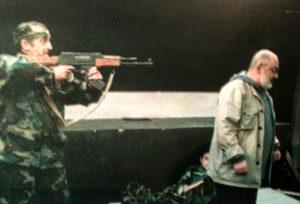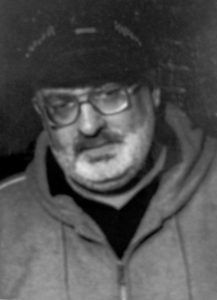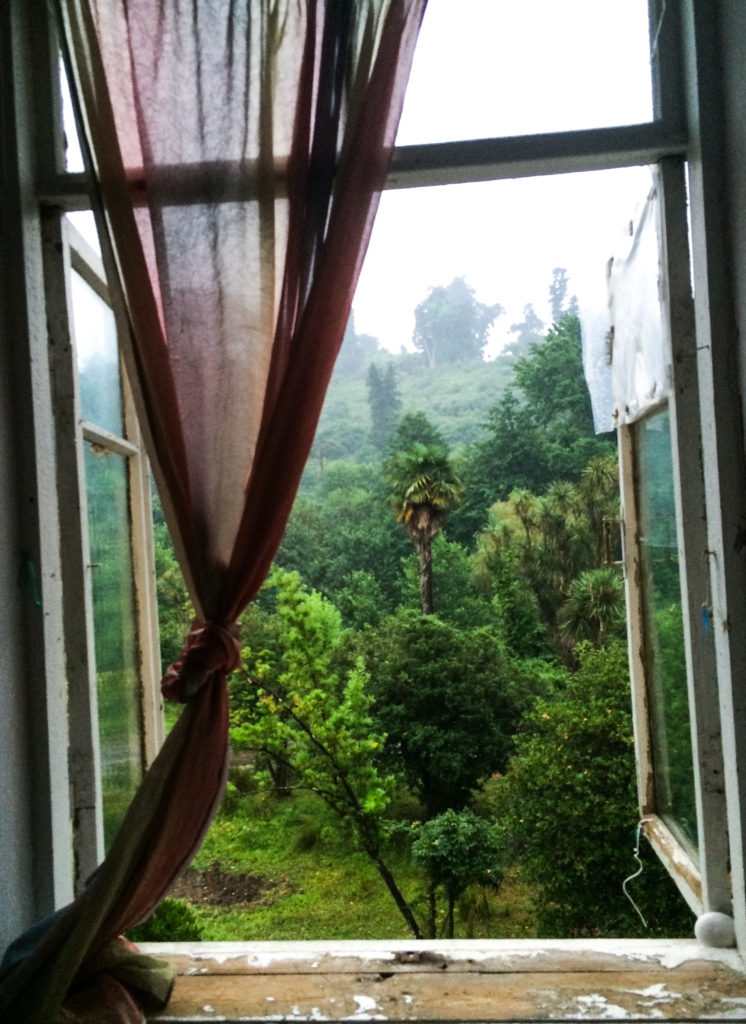Time stops, or rather, halts not in a remote spot, far off the main routes, but in a place where a scale of action is limited to some strict, clear patterns:
Chop the wood, crop the seed, fix the leak.
If there is a pool, it’s always wide and bridgeless. Although it may also be a clean and neat site with a fireplace and a paved descent to a beach. You never know.
Here, in Georgia, I first met him in his flat in a small town of Kutaisi. The apartment block, once considered a success of Soviet welfare now turned into a ruin, a small sky-scratching ghetto. A 16-storey building overlooking a swamp looks post-apocalyptic even in a place like this.
The first talk was a talk on frogs.
“Do you hear those bastards?” – Paata said.
I did.
From a distance of a few hundred meters the croacking sound caught my ear.
“That far?” – I asked Paata.
“Yes.” – he replied – “We have grand acoustics here”.
At a distance of about a kilometer from where we stood was a construction ground. Concrete structure started to emerge, a big thing resembling a concert hall or a fancy railway station.
“What’s that?” – I asked.
“A Parliament. Those idiots are building a house of representatives on a swamp. Can you hear that? They haven’t finished construction yet, but the MPs are already at work. “Sovieschayutsa” – he used the Russian word for counsel.
Paata split and flicked a cigarette butt it that direction.
“Lets go and have some wine.” – he suggested.
Paata used to be a military man during the Abkhazian war, though he avoided that talk.
“We were a squad of the four-eyed devils” – he once said – “everyone of my boys wore glasses. We where cameramen, poets, artists. I am a film director, you know. This work in the theatre is not what I’m really made for. I am shooting films. I am shooting movies, you know”.
Paata quitted the battalion the next day the war was over. He hasn’t shoot a movie for thirty years and never shoot a gun since the last day of war. And he wore glasses thick as an armor in a bulletproof vest.
He talked a lot of his experiments with drugs and his alcoholic breakouts.
“You know the one about a husband who came home drunk after he promised his wife to quit? So… Imagine a man at five in the morning; barely standing on his feet and his spouse opens the door. She gives him that kind of look, you know the one, but then he takes something out, some thing that he was hiding behind his back. And what do you think it was? You think it was a bottle? Ha! It was a book, and its title read: “Curing the alcoholism using the specific combination of young wine products”. So he looks at her triumphantly and says: “Sweetie, can’t you see, I’m healing? I’m having an intensive treatment but I’m doing much better now!”
His wife left him for good, but it was not because he drank or took drugs. Everyone did so in a post-war Georgia; every soldier who felt that it was he who lost the war.
She never loved him and she left him and then he met Dali – a goddess and his wife for the rest of his days.
Once he took a gun in his hand again. He then worked for the TV company in Tbilisi and one of the employees, a lady in her forties, came to the office of the editor-in-chief asking for money to save her sick husband.
“Your cancer is not by business” – the boss said.
Paata burst into his room with a gun. He laid the weapon on a table and said: “This won’t teach you to be a man, but at least may remind you what a fear is! If you won’t help this lady you will have to deal with me”.

He could never find a job in a capital again and moved to the swamp to face the frogs, the old theatre and to finally meet his woman.
“You’re Paata, the film director? The one who shoot “The Rat”? – She said when she first met him.
He courted her in a beautiful, old-fashioned manner, and then asked her father for the hand of his fiancée. Dali and Paata were both in their forties.
Once I met him in a small store in a village where he resided in the summertime. I haven’t seen him for years and there where plenty on niceties we wished to tell each other and one terrible story to be told; the story which I preserved for later.
Instead he asked: “How’s my little boy doing? How’s this rascal? I haven’t heard of him since last time both of you were here. I tried to call him, but the phone was out. Is he in town?”
He stood in front of me with a pack from the grocery in his hands.
I was not prepared for this question, although it was the only thing I really had to tell him. In fact, it was the reason I came.
“He shot himself in the head, Paata. He’s no longer here”.
Paata cried like a child and the whole street, the grocer, the customers, the cabman, hugged him and cried with him. For this is Georgia and when someone loses the one he loves this is a tragedy for the whole ubani, the district.
Last week I was there, I passed Kutaisi in a train, and never thought of Paata, being preoccupied with some thoughts of my own. I stayed in a small hamlet at the seaside, doing practically nothing, never seeking any encounter or a friendly talk.
 I walked out of my room to go to the sea, when a housekeeper called me by name.
I walked out of my room to go to the sea, when a housekeeper called me by name.
The old lady was not alone.
A woman was sitting on a porch with her, the woman who’s face looked familiar, though I couldn’t remember at an instance where and when we met.
I came closer, she looked me in the eye and then I recognized Dali.
As I approached it suddenly struck me: I’ve never seen her alone.
I sat at her side.
“Paata’s dead” – she said.
She looked the same. Same eyes, same face, same posture. She’s very aristocratic, an aging beauty always at the side of an old, fat, four-eyed, humorous man, who called himself a director who never shoot.
“Last year it happened. 18th of May”.
“Was he drinking?” – I asked.
“No. He wasn’t drinking lately.”
“Did he pass easily?”
“Yes.” — and she made a gesture, like a swimmer jumping from a pier.
We kept silence for a while and then she said:
“You know, Paata had a dream. He wanted to write 33 stories before he goes. But he only finished three of them. I would be glad if you have them”.
Now I have these stories with me, and although I don’t read Georgian it is somehow clear to me that they are bright and sincere.
Bright, clean and honest as the man himself.
By Aleksei Bobrovnikov

